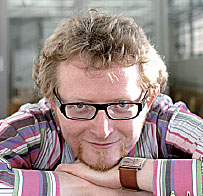Giuseppe Testa

Giuseppe Testa is Principal Investigator and Assistant Professor at the European Institute of Oncology in Milan where he heads since 2006 the laboratory of stem cell epigenetics. His academic training was in Medicine (MD at the University of Perugia), Molecular Biology (PhD at the EMBL), Bioethics and Science and Technology Studies (MA at Manchester University, visiting scholarship in the program on Science, Technology and Society at the Harvard Kennedy School and fellowship at the Berlin Institute of Advanced Studies). He completed his postdoctoral training in Dresden where he pioneered new stem cell genome engineering technologies and was awarded the European Doctorate for excellence of research in Biotechnology by the European Association for Higher Education in Biotechnology. His lab investigates the epigenetic mechanisms that enable the differentiation of stem cells and that mediate the reprogramming of somatic cells into pluripotent stem cells. He held invited lectures at distinguished scientific institutions worldwide and was invited as instructor at the Cold Spring Harbor Laboratory School on stem cell technologies. Over the course of the last ten years he integrated Bioethics and Science and Technology Studies (STS) in his scholarly track, founding in 2002 the Max Planck Institute Forum on Science and Society in Dresden and joining in 2006 Giovanni Boniolo in the establishment of the PhD Program in Foundations of Life Sciences and their Ethical Consequences at the European School of Molecular Medicine (SEMM) in Milan. In 2007 he was appointed on the Ethics and Public Policy Committee of the International Society for Stem Cell Research (ISSCR) and serves on the ethics advisory panel of the major European stem cell networks ESTools and NeuroStemCell. He is reviewer for several scientific journals and funding agencies both in molecular biology and bioethics/science and society. He is the author of several publications in leading international journals and the recipient of several awards, including the Roche Prize for Leading Bioscientist of the Next Decade (2003) and the National Prize of the Accademia dei Lincei for the best MD thesis (1997). His first book ”˜Die Gläsernen Gene. Die Erfindung des Individuums im molekularen Zeitalter (Visible genes. The invention of the individual in the molecular age ”“ translation forthcoming)', coauthored with Helga Nowotny, was published in 2009 by Suhrkamp in the Edition Unseld.





